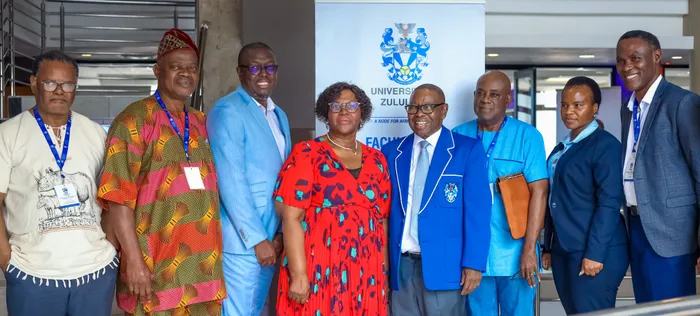Alliance and ANC must take responsibility for Eskom crisis - Blade Nzimande

From Left: University of Zululand Deputy Vice-Chancellor Prof Sipho Seepe, Professor Bewaji, Prof A Masoga, University of Zululand Vice-Chancellor Professor Xoliswa Mtose, Minister of Higher Education, Science and Technology Dr Blade Nzimande, Professor Agyeman, SADTU KZN Secretary, Nomarashiya Caluza and Dr RA Akpome during the University of Zululand’s inaugural conference on African thought, held at Richards Bay on Thursday. Picture: James Thwala
Durban — Higher Education, Science and Technology Minister Dr Blade Nzimande says the tripartite alliance still has a huge role to play in the governance of the country and in alleviating some of the country’s economic crises.
The minister was speaking to the Daily News in an exclusive interview on the sidelines of the University of Zululand’s inaugural conference on African thought, held at Richards Bay on Thursday.
Nzimande, who is a University of Zululand (UniZulu) alumnus, said: “The country has made a lot of progress. We have come a long way in providing free education, higher education for children and the working class.
“The National Student Financial Aid Scheme (NSFAS) is one of the single biggest achievements of this country. Today we speak of the middle class that has grown. NSFAS has played a huge role in creating that layer of black middle-class and black professionals. In 2018, NSFAS was just over R20 billion, now it is R47bn.”
He asked if there was another country (developed or developing) that did the same as South Africa.
“Research shows that NSFAS students perform better than average students. On December 1, we are celebrating 30 years with NSFAS.”
Nzimande also highlighted the issues at Eskom, saying the problem started in the late 1990s.
“The Eskom crisis started in 1998 when our own government refused to listen when we were told we must recapitalise Eskom because we were pursuing privatisation.”
He said that despite the challenges, the current government had made a lot of progress in the 28 years of democracy.
“If you look between 1894 and 1994, as well as 1994 and 2014, the ANC government has electrified more than twice the number of households in 20 years, compared with the prior 100 years.
“It is fashionable today to say all this is due to President Cyril Ramaphosa. As the alliance and as the ANC, we must take responsibility collectively for where we are today.”
Moreover, he said: “African epistemology has to deal with issues of capitalism. We (Africans) contribute the least with carbon emissions but suffer the most. African epistemology/ideologies should focus on teachings around how to deal with these issues.”
He said the first humans on the African continent worked with the ideology of co-operation and solidarity, instead of the notion of “dog eat dog”. The term ubuntu was adopted by southern Africans and followed the ideology of community, and working together.
“African epistemology should be explained with this ideology of co-operation, solidarity, community and working together in mind.”

Nzimande quoted former Soviet Union leader Vladimir Lenin, who said: “Theory without practice is sterile. Practice without theory is blind.”
He said that when teaching African epistemology, we should keep this in mind.
UniZulu Vice-Chancellor, Professor Xoliswa Mtose, said: “Through the current UniZulu Vision 27, we have taken the bold decision to move beyond creating a discursive space designed to ignite new imaginations about the trajectory about the university, but also to develop alternative ontological and epistemological orientations anchored on African thoughts. In this regard, our knowledge as a social project at UniZulu is informed by our own African history and identity – which it won’t apologise for.
“We consciously embrace epistemologies of the global sum as part and parcel of the geopolitics of knowledge and the problematic epistemologies of the global norm. We embrace African epistemologies in affirmation of our identity as an African university rather than a Westernised university in Africa. In the same way, we embrace our semi-rural setting in KwaZulu-Natal in post-apartheid South Africa, and we take seriously the indigenous epistemologies and socio-economic realities of our immediate communities.”
She said the university was ideally located as it could use the knowledge within its surroundings, and this differed from other universities that were surrounded by “Western modernity”.
Deputy Vice-Chancellor: Institutional Support at the University of Zululand, Professor Sipho Seepe, said: “Many African universities remain colonial institutions, that’s why the type of scholarship we have is extroverted – as it answers questions not about our challenges, but the way we mimic scholarships elsewhere.”
“At the University of Zululand, we’ve taken a position of trying to transform this university into an authentic African university that addresses and identifies challenges that the continent and our local communities face so that we become a part of the solution, and not an island in a sea of poverty.”
Pennsylvania State University Professor Michael West referred to the Mfecane that took place in South Africa, and used the translation to drive the point of how African epistemologies should be formulated.
The Mfecane was an event during the 19th century that played a significant role in the shaping of the Zulu nation. One of the translations for it is “the shattering” or “the scattering”.
West said: “African epistemology should focus on the shattering of the thought of the Eurocentric university and Eurocentric curriculum, and to scatter in their place, the African thought of intellectual self-emancipation – which is the foundation and killer of the global African university. This second Mfecane will refer not so much to the sword, but to the pen and should involve writing in black (ink), not in blood.
“African thought should be regenerated and remain towards the global African revolution.”
Daily News